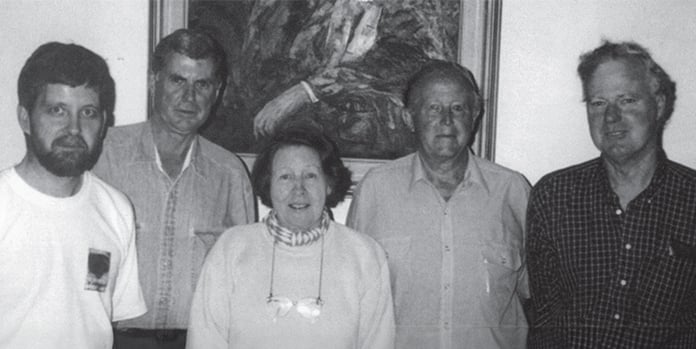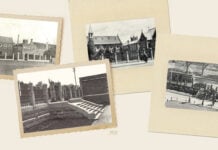
It’s a balmy late-summer evening. The crowd has gathered, the music plays, the lights come on. And so the magic begins.
The Quad Play is one of the significant legacies of Nigel Creese’s Headmastership (1970 – 87). The first production, Romeo and Juliet, was in 1974, and there has been a play performed in the Quad every year since (occasionally two). Even the pandemic couldn’t stop it: the 2020 and 2021 Quad Plays happily managing to escape the various lockdowns.
Early years
In 1974 I was in my final year as a student at Melbourne Grammar School and was lucky enough to be chosen to conduct a small string ensemble that played during the interval of that production. I remember it rained on two of the three nights, but the show went on regardless! Nigel was very determined about that.
In those early years, the plays were performed on a make-shift wooden stage, with the audience sitting on chairs on the ground. In 1991, for the first time, tiered seating on scaffolding was introduced to allow better viewing and a larger stage area; that model has been used for the majority of plays since.
Shifting stages
The vision for the first Quad Play undoubtedly owed much to the physical shape of the western end of the Quad, the bluestone balcony ideally suited to Juliet’s early scenes with Romeo.
Subsequent productions saw it used as battlements, musicians’ gallery and even the deck of a foundering ship, but it was not long before the setting migrated to other parts of the Quad, first to the Chapel end, then to the centre and once, memorably, stretched almost end-to-end with the audience on the two long sides for the 2001 Antony and Cleopatra.
For the 1997 Midsummer Night’s Dream we built a large pond in the middle of the Quad, with real plants and live fish. More recently, Sydney Rd was recreated in the heart of the Bluestone for 2022’s Romeo and Juliet, and the front of the Chapel and its doors were used to great effect in last year’s Macbeth. The only common factor: the bluestone walls and ambience of the Quad.
Music and lights
Music has always played a vital role. Nigel Creese believed it should always be live, not recorded, and often originally composed for the production by a current student. Some directors, however (including me), couldn’t resist the temptation to introduce a bigger soundscape, using recorded music. I suspect Nigel didn’t approve though he never said anything. He never missed a Quad Play.
The advent of LED lights in recent years has been another significant innovation: no more rushing to cover the lights when the rain started falling! And, of course, with LED lights came an infinite array of colour, easily switched from one scene to the next and creating marvellous splashes of colour on the bluestone; not to mention spotting the occasional startled possum innocently crossing the roof-ridge mid-performance.
Unsung heroes
The honour roll of those who have helped shape the Quad Play into the enduring success it is includes a number of very significant “unsung heroes”, both members of staff and Old Melburnians.
When Lawrence Doolan joined the Maths Department in 1976, he was immediately recruited to join the production team for those hot rehearsals in February. Along with a team of boys, he would construct the wooden stage each year until they graduated to building the scaffolding for the audience to sit on, with the actors performing on the bricks.
Michael Arnold, another mathematician, was responsible for lighting from 1974 until his retirement in 1987, scaling the lighting tower as if he was born to it.
Backstage, co-Producer Val Creese designed and made costumes for the first fourteen years, while Geoffrey Smith – who would direct the 1989 Quad Play – added his historian’s eye; he would later be assisted by Sally Scott, Kylie Witt and Darlene Fisher.
Meanwhile Old Melburnians Richard Burman (OM 1955) and Mark Williams (OM 1976) led a make-up team responsible for transforming teenage actors into credible adult characters. In charge of Front of House was Michael Wilkins, long-time English teacher, always ready with some pointed words to marshal the last-minute arrivals. More recently, Leah Kelly and Matthew Di Petta have also contributed significantly.
So many memories
If those stones could speak, what stories would they tell and what memories would they hold? The Quad has seen it all: vigorous sword-fights, tender love scenes, actors carrying flaming torches, various bodies carried on and off on biers.
And, of course, so many young actors inhabiting mature characters with such energy and confidence, some of them going on to professional careers (Huw Williams (OM 1977), Barrie Kosky (OM 1984), Simon Stone (OM 2001) and Jack Martin (OM 2013) are just some who spring to mind), others possibly never to grace the stage again, but all captivated by the magic of the Quad and its limitless possibility.
It is a wonderful tradition that Nigel and Val and Ross Clayton started fifty years ago. Long may it flourish.
Dr Tim Scott (OM 1973)
Director of the Quad Play, 1988; 1990-2001
Quad Plays (1974 – 2024)
1974 Romeo & Juliet 1
1975 Twelfth Night 2
1976 Hamlet 2
1977 King Lear 2
1978 Macbeth 2
1979 A Midsummer Nights Dream 1
1980 Oedipus 3
1980 The Taming of the Shrew 3
1981 The Winters Tale 1
1982 Othello 1
1983 Antony & Cleopatra 1
1984 Romeo & Juliet 1
1985 Antigone 4
1985 The Comedy of Errors 4
1986 King Lear 1
1987 Hamlet 1
1988 As You Like It 5
1989 The Merry Wives of Windsor 6
1990 Richard III 5
1991 The Tempest 5
1992 Much Ado About Nothing 5
1993 Macbeth 5
1994 The Bacchae by Euripides 5
1994 The Two Gentlemen of Verona 5
1995 Richard III 5
1996 Hamlet 5
1997 A Midsummer Nights Dream 5
1998 The Winters Tale 5
1999 King Lear 5
2000 Love’s Labour’s Lost 5
2001 Antony & Cleopatra 5
2002 Julius Caesar 7
2003 Romeo & Juliet 7
2004 Twelfth Night 7
2005 Macbeth 7
2006 The Tempest 8
2007 Dr Faustus by Christopher Marlowe 8
2008 Othello 8
2009 A Midsummer Nights Dream 8
2010 Hamlet 8
2011 Much Ado About Nothing 8
2012 The Bacchae by Euripides 8
2013 Twelfth Night 8
2014 Antony & Cleopatra 8
2015 As You Like It 8
2016 Romeo & Juliet 8
2017 King Lear 8
2018 Antigone 8
2019 Richard III 8
2020 A Midsummer Nights Dream 9
2021 Two Gentlemen of Verona 9
2022 Romeo & Juliet 9
2023 Macbeth 9
2024 Julius Caesar 9
Directors
1 Nigel Creese, Ross Clayton & Val Creese
2 Nigel Creese & Ross Clayton
3 Nigel Creese, Ross Clayton, Val Creese & Lawrence Doolan
4 Nigel Creese, Val Creese & Tim Scott
5 Tim Scott
6 Geoffrey Smith
7 Matthew O’Meara
8 Sharon Mulready
9 Belinda Annan


